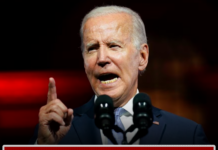U.S. Sen. Chuck Grassley and Rep. Jim Banks (R-Ind.) took to the floors of the Senate and House of Representatives to call on General Mark Milley to finally and fully answer questions about the reports that he inserted himself into the statutory chain of command—undermining civilian control of the U.S. military.
“I’m calling on General Milley to set the record straight. General Milley is accused of secretly seizing the president’s military powers. That is the most serious crime. If he is innocent, he has a duty to say so,” Rep. Banks said in a speech today.
“On April 11th, with twelve pointed questions, we gave General Milley a second bite of the apple to clear the air. General Milley, honor your word. Answer the questions. Come clean with the American people,” Sen. Grassley said in a separate speech to the Senate.
Milley has yet to respond to Grassley and Banks now months-old questions. Lawmakers have been seeking clarity on this serious potential breach of the American democratic order since the publication of Bob Woodward’s and Robert Costa’s book Peril in 2021.
Video of Rep. Banks’ speech can be found HERE.
Video of Sen. Grassley’s speech can be found HERE, and his prepared remarks follow.
Prepared Floor Statement by Senator Chuck Grassley of Iowa
Emeritus President Pro Tempore of the United States Senate
On Civilian Control of the Military and Accountability
July 14, 2022
Mr. President, I come to the floor to sound the alarm about one of America’s guiding principles—civilian control of the military—a cornerstone of our Republic. This fundamental principle of self-government may have been in jeopardy during the final days of the Trump Administration.
Before I get to that, I will provide historical context. That principle became part of the American fabric on June 14, 1775, when Congress appointed George Washington commander of the Continental Army. His commission ordered him to report to civilian authority. It specified, “You are to punctually observe such orders and directions, from time to time, as you shall receive from this, or a future Congress of these United Colonies. “At the war’s end, General Washington gave this principle lasting purpose with power and grace.
On December 23, 1783, in a solemn ceremony at the statehouse in Annapolis, he voluntarily surrendered his commission – and military power – to civilian authority – the President of the Continental Congress. The scene is memorialized in a dramatic John Trumbull painting that hangs in the Rotunda not far from where I stand.
Dictators rule their nations with an iron fist, because they control the sword. Washington selflessly laid down his sword to ensure America’s destiny for generations to come. He chose to disband the army and return to private life at Mount Vernon. As one scholar put it, “the Virginian went home to plow.” By this noble act, he cemented a crown jewel of self-rule—civilian control of the military.
Five years later, as Washington was elected president, this bedrock principle was enshrined in the Constitution. Civilian control of the military is essential to the preservation of our precious democracy. It’s incumbent on the armed forces, and especially senior officers, to be faithful to this governing rule.
It has been challenged with serious consequences. The Truman-MacArthur dispute over the conduct of the Korean War is case in point. Truman wanted to limit the war. MacArthur disagreed, defied orders, and criticized Truman’s decision publicly. So Truman fired him for insubordination.
Recently, several books, including Peril by Bob Woodward and Robert Costa, suggest that the Chairman of the Joint Chiefs of Staff, General Milley, may have trampled on this principle. Peril provides an alarming account of his words and deeds. Milley told the authors he “was certain” that the commander in chief was “in serious mental decline … and could go rogue and order military action or the use of nuclear weapons.”
“Milley felt no absolute certainty the military could control or trust the President.” So Milley “took any and all necessary precautions.”
“His job,” he said, was “to think the unthinkable” and “pull a Schlesinger.” To “contain Trump,” he had to “inject a second opinion” – his opinion – into the command structure. In doing so, he may have stepped out of his lane as the President’s principal military advisor … And into the statutory chain of command where he doesn’t belong. By law, the Chairman of the Joint Chiefs of Staff has no command authority.
When President Nixon faced a crisis over impeachment and resignation, Secretary of Defense Schlesinger feared he might order an unprovoked nuclear strike. So he reportedly took extralegal steps to prevent it.
Pulling a Milley is a very different kettle of fish. A four-star general can’t “pull a Schlesinger.” Schlesinger was at the top of the chain of command, just below the President. He kept the President’s constitutional command authority firmly in civilian hands. Milley allegedly placed military hands—his hands—on controls that belong exclusively to the President.
According to Peril, he summoned senior operations officers in the National Military Command Center to his office. He had them take “an oath” not to “act” on the President’s orders without checking with him first. These brazen words and actions—if accurate—strike at the heart of our democracy—civilian control of the military—and show utter contempt for the commander-in-chief.
Coming from the nation’s top general, they are dangerous and contrary to military code: TEN-US CODE-888. After describing Milley’s actions, Peril’s authors rightly asked, “Was he subverting the president? Had he overstepped his authority and taken extraordinary power for himself?”
Milley assured me that his actions were on the up and up. The books tell a different story.
Senator Blackburn asked him about the mismatch. He replied, “I haven’t read any of the books. So I don’t know.” She said read them and report back to us. “Absolutely,” he agreed, “happy to do that.”
Nine months later, he’s still dodging the question with the same lame excuse. To crank up the pressure, I joined Senators Paul and Blackburn in a letter pushing for a straight answer. When none came, I began sending hand-written notes. I soon received a 10-page letter from General Milley that ignored the question.
My second note sparked an email. It claimed our letter did not raise “a direct question” and asserted “General Milley answered the specific questions.” Is that Pentagon baloney or what?
After my third note, General Milley responded with the same old smoke and mirrors routine: “I have never read the books.” Years of oversight have taught me this lesson: evasive answers usually offer revealing clues to the truth. He knows better… He knows the score.
If those books, and all attendant press coverage, had contained gross misrepresentations, we would have heard about it long ago. He would have hammered the authors and corrected the record. Not a peep from the general. His silence speaks volumes.
Something doesn’t smell right. As a Pentagon watchdog, when I get a whiff of wrongdoing, I sink in my teeth and don’t let go. So Congressman Jim Banks, a member of the Armed Services Committee, and I upped the ante. On April 11th, with twelve pointed questions, we gave General Milley a second bite of the apple to clear the air. General Milley, honor your word. Answer the questions. Come clean with the American people. We are all ears.















